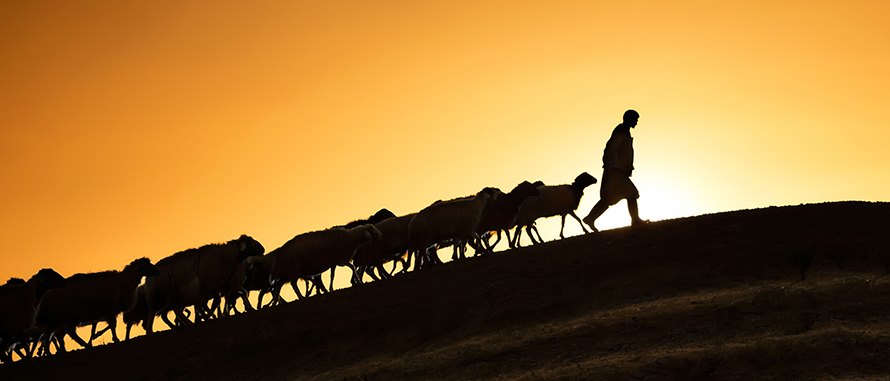When we read the Bible, we found David primarily as a shepherd, was the youngest of his brethren, and was not part of the special sacrifice organized by Samuel; However, it was he whom God had chosen, man according to God’s heart. , and so he was called from the field where he cared for the flock to be anointed king. God called him to shepherd another flock, his people of Israel (1Sam 16. 1-13; 2Sam 5. 2, Sl 78. 70-71).
Livestock is one of the oldest professions. Therefore, it is not surprising that the care of a shepherd and his relationship with his flock are a common metaphor in the ancient Near East for the direction of people, especially royalty. In addition, several gods of nations were sometimes mentioned as shepherds. In the Bible, civil and religious leaders are called pastors, and images are related to royalty (e. g. 1 Kings 22,17), especially David. God is called pastor (for example, Genesis 48,15; Come out 23,1; 80,1), and the elements of a shepherd’s life occur several times to describe God’s activity (for example, Psalm 31,3; Is 40. 11; Mc 7:14).
- Even after leaving the pastures.
- David continued in his life to act as a shepherd; much of what he learned by guiding sheep.
- He applied it as a leader of men.
- He is famous as He appealed to his exploits in caring for the flock.
- And how He depended on God to demonstrate his ability to fight Goliath (1 Sam 17:34-37).
- David’s experiences as a shepherd are also seen in the form of his poetry.
- Providing rich images for many of his dearest psalms.
- Including Psalm 23.
David knew the constant care required to be a good shepherd and applied it as a rich metaphor for God’s constant care for him in Psalm 23.
Trying to imagine David’s life as a shepherd is not easy for most of us, because we live in a modern urban world. Breeding in the ancient world was, in many ways, simpler than our busy lives, because most of the time it was about seeing animals graze. But it was far from a routine and lacked interest. To this day, animal care presents unique challenges, especially with sheep in need of more care, in addition to climate challenges. We can summarize a pastor’s life as a life of constant care.
Did David need to provide food and water to his sheep? It is not an easy task for a shepherd of Bethlehem The Bible describes Canaan as a good land, a land of blessings for God’s people, but not too exuberant. The land, the areas that received the most rain, were reserved for agriculture. Pastors traversed hills and valleys in more remote and often steep areas with less precipitation. There have been periods of abundance, but when we think of David as a shepherd, we should not imagine continuous green meadows.
To feed his flocks, David needed to be a good guide, as shepherd’s life involved walking a lot. Every day, the shepherd pulled his flock out of the village’s safety to walk through the hills and valleys, in order to provide them with enough grass. In this daily routine, a good shepherd should be aware of the needs of the flock as a whole and the needs of each sheep.
During an archaeological visit to Jordan, I was able to observe the Bedouin shepherds and their flocks. Every morning, they traveled several miles in search of proper pastures. I was always surprised that they could keep their flocks together and on track, although, as in David’s day, there were no fences to contain them. During the day, sheep and goats are sent to graze and rest. Then the shepherds gathered their flocks to make the journey back to the village before nightfall, making sure everyone was counted.
David was also to be the shepherd of his flock. Bedouin shepherds do not face the same threats as the wild animals David suffered; there are still wolves and leopards in Israel, but lions and bears that David knew were gone; sheep and goats are easy prey, so shepherds must be vigilant protectors, sometimes putting their own lives at risk. Even if a shepherd manages to hunt these dangerous predators, the herd is likely to spread and have to be gathered, often in several corners and corners. Dogs have been used to help protect herds from wild animals and are sometimes mentioned in the Bible (Job 30:1; Is 56:11), but never like David’s companions.
All these elements show how close the bond between a shepherd and his sheep was, he was his constant companion and would need to know them individually and intimately to take good care of them, the sheep have learned to trust their shepherd, to follow their shepherd. David knew the constant care required to be a good shepherd and therefore used a rich metaphor for God’s constant care for him in Psalm 23. We know even more fully the cost of God’s constant care for us, as seen in Jesus, who says, “I am the good shepherd. Does the good shepherd give his life for the sheep?” (Jo 10:11).

